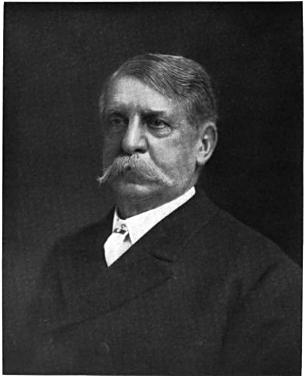Senator John Taylor's Birthday and His Gift to New Jersey

While the nation wrestles with its problems ranging from managing the pandemic to changing a state flag or renaming streets or deciding what the best approach for Halloween safety will be, one battle carries on—and will probably continue to carry on—in New Jersey exclusively. That is, what, exactly, is the right term for the uniquely New Jersey breakfast meat called Taylor Ham or Pork Roll.
In the spirit of reconciliation, something New Jersey is not particularly known for when it comes to matters of such grave importance as this, readers should consider that maybe neither is "incorrect". And we should take that consideration in mind because on October 6, 1836, unto the city of Hamilton Square, a child was born who would redeem the tastebuds of his fellow New Jerseyans and simultaneously spark arguments for decades to come.
John Taylor was to rise rapidly in the grocery industry in the Trenton area. In 1856, he put forward a spiced meat derived from pork and other to-this-day-secret ingredients. The name of the meat, however, was not finalized and, in time, there were other sellers trying to horn in on Taylor’s little empire. The Taylor Provisions Company was established in 1888, when John Taylor was 52 and a man of considerable means in Mercer county. The product was called “Taylor’s Prepared Ham” until the Pure Food & Drug Act under President Theodore Roosevelt determined that the federal definition of ham did not coincide with this New Jersey creation. Thereafter, the product was called “Taylor Pork Roll.”
In the 1860s, Taylor married, had children, and the family lives on today.
Readers may not be aware that John Taylor, in addition to producing his home state’s prized sandwich meat, was also a political figure. Taylor served as a Republican councilman for the capital city, and later was elected in 1880 as a state senator. The Meat Magnate of Mercer served just one term, apparently uninterested in running for reelection.
Taylor, having money and influence, wanted to expand culture in the city and, in 1867, the Taylor Opera House was opened. The Taylor Opera House no longer exists today but in its time it played host to a number of grand events, including the inaugurations of New Jersey governors like George McClellan, who served as a Union commanding general in the Civil War before running against Lincoln as a Democrat; Woodrow Wilson, who became the president and led the nation through the First World War; James Fielder, whose term was briefly interrupted to avoid constitutional problems when transitioning from acting-governor on Wilson’s departure to elected governor; and Walter Edge, who served 1917-1919 and again 1944-1947.
The Taylor Opera House ceased to be in 1921, becoming a cinema under a new name, and met an ignominious end when it was demolished for a parking lot in 1969.
According to the Trenton Historical Society’s “A History of Trenton 1679-1929” Taylor, a grocery power-house in his own right, had a hand to play in disestablishing street markets in the city. “On April 1, 1870, John Taylor, who had been prominently associated with the movement to abandon the street markets, erected a permanent market inside the house-line on the east side of Greene Street, just south of Academy. The building measured 51 by 120 feet and contained 53 stalls and a restaurant. Shortly after this, Samuel K. Wilson and Jacob R. Freese built a market in Chancery Street, near Quarry (now Hanover), on what is now the site of the First Precinct police station. Those who had sought to have the city build its market in Second Street in 1815 had also offered the alternative proposition of opening a street 80 feet wide through the government lot (which Joseph Wood, Joseph C. Potts, John A. Weart and Dr. John McKelway had bought), from Second Street to Potts Alley, and to build markets thereon, to be given to the city should the Council choose to accept their proposition. This alternative offer also fell through when the citizens definitely voted for the Greene Street site.”
There was no monopoly on meats like Taylor’s product, of course. But the name was posing a problem. Confusion over just what this food was resulted in something of a commercial turf war over who had the claim to the crown. According to New Jersey Pork Roll, the company which produces the original Taylor Pork Roll to this day in Trenton, after the Pure Food & Drug Act required a name change, “The new name was ‘Pork Roll’ and it was marketed as both ‘Taylor’s Pork Roll’ and ‘Trenton Pork Roll’. Competitors marketed products with similar names like ‘Rolled Pork’ and ‘Trenton style Pork Roll’ and were sued by Taylor. A 1910 legal case ruled that the words ‘Pork Roll’ could not be trademarked. In 1910 it was described as ‘a food article made of pork, packed in a cylindrical cotton sack or bag in such form that it could be quickly prepared for cooking by slicing without removal from the bag.’”
John Taylor did not live to see the court decision, however. He died in 1909, aged 72, and is buried in Trenton’s Riverview Cemetery.
So even he did not know exactly what his product was officially, legally, definitively called. But Taylor and all New Jerseyans would agree that even if people don’t see eye-to-eye on the term, when they bite into it, they know they are home in New Jersey.
Happy 184th birthday, Senator Taylor, and thank you.





